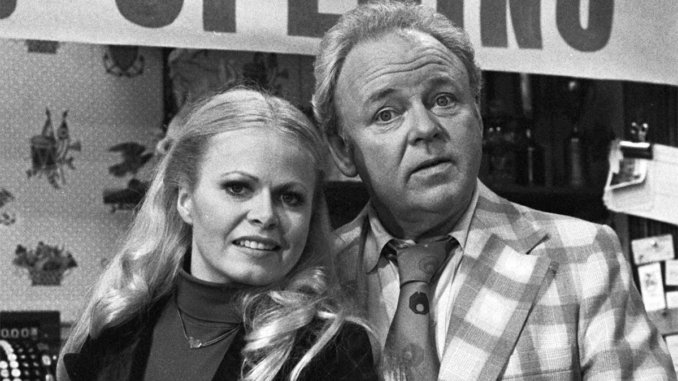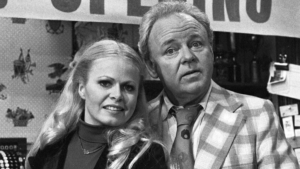
Fifty-four years ago, All in the Family premiered on CBS, revolutionizing television and forever changing the landscape of American pop culture. Created by Norman Lear, the sitcom featured Archie Bunker, a blue-collar, bigoted father whose controversial views and sharp tongue became a cultural touchstone. The show’s unflinching exploration of topics such as racism, sexism, war, and civil rights was a radical departure from the typically light-hearted family sitcoms of the time, which seldom ventured into politically charged territory. Over the course of its nine-season run, All in the Family would become one of the most influential television programs ever aired, and its legacy continues to resonate to this day.
A new book, All in the Family: The Inside Story of the Show That Changed Television, takes a deep dive into the groundbreaking series, exploring how it tackled taboo subjects, reshaped sitcom storytelling, and offered a window into a nation at a crossroads. The book, written by historian and journalist Jonathan Coleman, sheds light on how Lear’s audacious vision for the show captured a pivotal moment in American history and how its success changed television forever.
In this article, we will reflect on the impact of All in the Family through the lens of Coleman’s new book and examine how the show pushed boundaries, challenged conventions, and sparked conversations that remain relevant more than five decades later.
The Genesis of “All in the Family”
The journey of All in the Family began long before it aired in 1971. Norman Lear, a television producer with a background in comedy, had been working in the industry for years, but it wasn’t until the late 1960s that he began to envision a show that would confront the social and political issues of the time head-on. The 1960s were marked by upheaval and change: the Civil Rights Movement, the Vietnam War, the rise of feminism, and the growing influence of the counterculture were reshaping American society. Lear saw an opportunity to create a sitcom that could reflect this seismic shift while offering a biting critique of the status quo.
Lear’s original idea for the show was to focus on a working-class family, with the father serving as the focal point of the series. But instead of presenting a typical, wholesome father figure like those seen in shows like Leave It to Beaver or The Dick Van Dyke Show, Lear wanted to create a character who was unapologetically prejudiced, politically incorrect, and outspoken in his beliefs. This character would be Archie Bunker, a loud, opinionated, and often bigoted man who would clash with his more liberal-minded family members.
The idea was controversial from the start. CBS executives were hesitant about the concept, fearing that it would alienate viewers and create backlash. But Lear was determined. He believed that television could be more than just entertainment—it could be a mirror of society, a way to spark discussions about the most pressing issues of the day. After multiple rounds of development, All in the Family was greenlit and debuted on January 12, 1971.

The Radical Nature of “All in the Family”
When All in the Family premiered, it was immediately clear that it was unlike anything television had seen before. The show’s premiere episode, titled “Meet the Bunkers,” introduced audiences to the Bunker family: Archie, his wife Edith (Jean Stapleton), their daughter Gloria (Sally Struthers), and her husband Mike (Rob Reiner). The pilot episode established the show’s central dynamic: Archie’s old-fashioned, often bigoted views clashing with the more progressive ideals of his son-in-law, Mike.
What made All in the Family so revolutionary was its willingness to tackle sensitive and controversial topics head-on. Racism, sexism, war, homosexuality, and other societal issues were discussed openly and without apology. In the very first episode, Archie expresses his frustration with his daughter’s marriage to Mike, calling him a “meathead” because of his liberal views. Over the course of the series, Archie’s disdain for the “new” social movements of the time would become a recurring theme, with the character delivering tirades against civil rights activists, feminists, and anti-Vietnam War protesters.
But what set All in the Family apart was how it framed Archie’s bigotry. The show didn’t simply present Archie as a one-dimensional villain; instead, it offered a nuanced portrayal of a man who represented the anxieties and prejudices of a certain segment of American society. The series didn’t shy away from exposing the flaws in Archie’s character, but it also provided a platform for discussions about the changing social and political landscape of the time. The result was a show that was both funny and thought-provoking, delivering its message with a sharp edge of satire and humor.
The Characters That Defined “All in the Family”
At the heart of All in the Family was its unforgettable cast of characters, each of whom played a pivotal role in the show’s success. The character of Archie Bunker, portrayed by Carroll O’Connor, became one of the most iconic and controversial figures in television history. O’Connor’s portrayal of Archie was both comedic and tragic, capturing the complexity of a man who felt left behind by the rapid changes in society. Archie’s stubbornness and prejudice were often played for laughs, but they also served as a vehicle for social commentary, sparking debates about race, class, and cultural divides.
Jean Stapleton’s portrayal of Edith Bunker, Archie’s long-suffering wife, was another key element of the show’s success. Edith was the opposite of Archie in many ways—gentle, kind-hearted, and often oblivious to the harshness of the world around her. Yet, she was also a voice of reason and compassion in the family, providing a counterbalance to Archie’s cynicism and bigotry. The dynamic between Archie and Edith was both comedic and poignant, and it gave the show an emotional depth that was rare for sitcoms of the time.
Rob Reiner’s portrayal of Mike Stivic, Archie’s progressive son-in-law, brought a fresh perspective to the show. Mike’s liberal views often put him at odds with Archie, and the resulting clash of ideologies became a central element of the series. Mike’s character was a mouthpiece for the younger, more progressive generation, and his interactions with Archie created some of the most memorable and charged moments in the show’s history.
Sally Struthers’ portrayal of Gloria Bunker, Archie’s daughter, provided another layer to the family dynamic. Gloria, like Mike, was progressive and open-minded, but she was also caught between her father’s old-fashioned beliefs and her husband’s radical ideals. Her character embodied the tension that many Americans felt during the era of social change—caught between tradition and progress, the old and the new.
The Cultural Impact of “All in the Family”
From the moment it aired, All in the Family sparked controversy and conversation. Viewers were shocked by the show’s frank approach to issues that had previously been off-limits on television. The show’s depiction of Archie Bunker as a racist, sexist, and homophobic character was both a critique of society and a reflection of it. While many progressive viewers decried Archie’s views as offensive, others saw the show as a valuable tool for discussing the prejudices that were still prevalent in American society.
The impact of All in the Family extended beyond its portrayal of controversial topics. The show also revolutionized the sitcom format. Prior to All in the Family, sitcoms were often lighthearted and focused on harmless domestic humor. All in the Family broke that mold by introducing a more realistic portrayal of family life, where conflicts were messy, uncomfortable, and often unresolved. The show’s raw honesty about social issues was unprecedented, and it paved the way for other series that would tackle similar themes, such as Maude, Good Times, and The Jeffersons.
But perhaps the most lasting impact of All in the Family was its role in challenging the cultural and political status quo. The show’s ability to address issues like racism, sexism, and class in a way that was both entertaining and thought-provoking was revolutionary. By making these difficult topics the subject of humor and satire, the show created a space for Americans to engage with uncomfortable truths in a way that was both cathartic and eye-opening.
The Legacy of “All in the Family”
Today, All in the Family is widely regarded as one of the greatest television shows of all time. It won numerous awards, including multiple Emmys, and its influence can still be seen in the work of modern TV creators who continue to push boundaries and explore controversial topics. Shows like The Simpsons, South Park, and The Office have all drawn inspiration from All in the Family, using humor and satire to address the social issues of their time.
The new book All in the Family: The Inside Story of the Show That Changed Television serves as a reminder of the show’s enduring relevance. The book not only chronicles the making of the show but also provides insight into the cultural and political climate of the 1970s, offering a window into the tensions and divisions that defined the era. It also explores how All in the Family helped lay the groundwork for the television landscape we know today, where shows are more willing than ever to confront uncomfortable truths about society.
As we look back on All in the Family 54 years later, it’s clear that its impact is far-reaching and profound. The show changed television by breaking taboos, creating space for difficult conversations, and reflecting the complex, divided nature of American society. In a time when cultural and political divides seem more entrenched than ever, All in the Family reminds us of the power of television to engage, challenge, and entertain—all while holding a mirror to our most deeply held beliefs.
